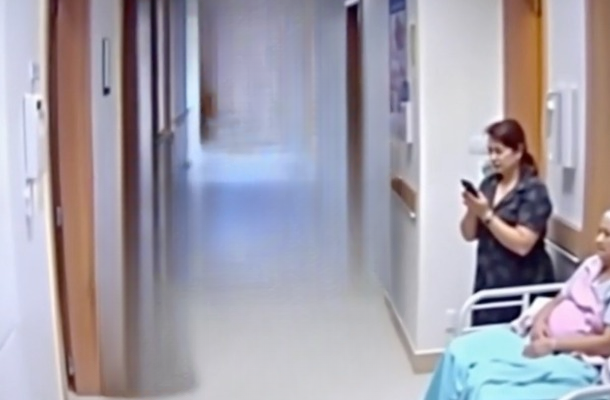In the quiet stillness of a hospital room, time often feels suspended. The rhythmic beeping of monitors fills the silence, creating a backdrop that is both reassuring and unsettling. Machines hum, screens glow, and footsteps echo faintly in the hallway. For Sarah, who sat at her mother’s bedside, those sounds were no longer background noise—they were reminders of fragility, of the delicate balance between life and uncertainty.

Her mother had come into the hospital for what doctors described as a routine procedure. Nothing extraordinary, nothing that should have sparked deep concern. A surgery, yes, but one with low risks and an expected recovery timeline. Sarah had clung to those reassurances, repeating them to her mother and herself alike.
But now, just a few days later, the situation looked entirely different. Her mother lay still, her chest rising only with the aid of machines, her vibrant spirit dimmed to a faint flicker. The energy she once carried into every room—the warmth in her laughter, the spark in her conversations—seemed like a distant memory.
Sarah’s heart was heavy with questions. What had gone wrong? Why had a “routine” operation left her mother in such a vulnerable state? Doctors spoke of complications, describing them with practiced professionalism. They offered medical explanations, citing rare but possible outcomes. Nurses worked with calm efficiency, providing care with compassion but without answers that satisfied Sarah’s restless mind.
She was left with a gnawing unease, a feeling that something was missing from the story. Yet, beneath her suspicions lay another truth she could not ignore: life itself is unpredictable, and even the most advanced medical systems are not immune to uncertainty.
The Burden of Uncertainty
Sarah’s emotions were a whirlwind. At times she felt anger—sharp, burning, and consuming. At other times, despair overtook her, pulling her into a heaviness that seemed impossible to escape. She questioned whether her reactions were fair. Was she right to suspect mistakes? Or was she trying to impose order on a reality that often resists explanation?
Uncertainty, she realized, is one of the hardest burdens for families to carry. It is easier to point fingers, to seek a clear cause for suffering, than to sit with the truth that some events have no simple answers. In those long hospital hours, Sarah found herself reflecting not only on her mother’s condition but also on her own inner turmoil.
Was her anger a shield against grief? Was her suspicion a way to avoid facing the terrifying reality that sometimes, despite everyone’s best efforts, outcomes are not what we hope for? These questions kept circling her mind as she sat in the dim light of the hospital, holding her mother’s hand and searching for meaning.
Hospitals: Places of Healing, But Also of Vulnerability
Hospitals are paradoxical spaces. They are built to heal, staffed by professionals who dedicate their lives to saving others. Yet they are also places where human vulnerability is laid bare. Every patient who walks through their doors carries hope in one hand and fear in the other.
Sarah reflected on how quickly her perception of the hospital had shifted. Before her mother’s procedure, it had felt like a place of safety. Skilled doctors, modern equipment, a reputation for reliability—these gave her confidence. But now, sitting in the sterile room with her mother attached to wires and tubes, that confidence had eroded.
She thought of other families she had seen in the waiting area—faces etched with fatigue, eyes searching for comfort. Each one carried their own story of worry and resilience. It reminded her that she was not alone, even though her pain felt uniquely personal.
Anger and Its Many Faces
Sarah’s anger puzzled her as much as her grief. It wasn’t just directed at the hospital staff. It seemed to flow outward in every direction—toward the doctors for their explanations, toward the system for its limitations, even toward fate itself for its unpredictability.
But as she sat with those emotions, Sarah began to recognize something deeper: anger often disguises pain. It can feel easier to rage at something external than to acknowledge the rawness of fear and sorrow. She wondered if her anger was a form of protection, shielding her from fully confronting the possibility of loss.
This realization didn’t erase her feelings, but it softened them. She started to see that her emotions, though overwhelming, were part of the natural process of grappling with uncertainty and change.
The Role of Advocacy
As the days passed, Sarah shifted her focus. She realized that while she couldn’t control the outcome, she could control her role in supporting her mother. Instead of letting anger consume her, she began to channel it into advocacy. She asked thoughtful questions, requested detailed explanations, and made sure her mother’s needs were never overlooked.
Advocacy, she learned, was not about confrontation. It was about ensuring her mother received the best possible care by fostering collaboration with the medical team. By shifting from suspicion to constructive involvement, Sarah found a sense of purpose in the midst of chaos.
The Bigger Picture: Trust and Healing
Sarah’s story is not unique. Around the world, families face similar struggles when medical procedures do not go as planned. These situations raise larger questions about trust, communication, and the human experience within healthcare.
Trust, once shaken, can be hard to rebuild. Patients and families often wrestle with doubts, wondering whether outcomes could have been different. At the same time, healthcare providers carry their own burdens—the weight of responsibility, the reality of limitations, and the challenge of communicating difficult truths with compassion.
Healing, then, is not only physical. It is also emotional, requiring both sides—families and providers—to find ways to navigate uncertainty together.
A Daughter’s Resolution
One morning, as sunlight filtered through the blinds of the hospital room, Sarah felt a shift within herself. The fear was still there, and the questions had not vanished, but a sense of clarity had emerged.
Her mother needed her strength, not her fury. Her role was not to carry anger but to provide presence, patience, and love. Whatever the outcome, Sarah wanted her mother to feel supported and cherished.
This realization marked a turning point. She began to approach each day with a renewed sense of calm, focusing on moments of connection rather than on unanswered questions. Holding her mother’s hand, speaking softly to her, and remembering the vibrant woman she had always been—these became her anchors.
Beyond the Hospital Walls
Sarah’s experience left her with lessons she knew would shape her long after her mother’s recovery journey ended. She learned that life’s uncertainties cannot always be solved, but they can be faced with courage. She discovered that advocacy can be a powerful response to fear, and that love, expressed through presence, is often the most healing force of all.
She also came to understand that hospitals, despite their imperfections, are staffed by individuals who strive to help, even when outcomes are not ideal. Recognizing their humanity helped her soften the edges of her anger and replace them with empathy.
Conclusion: Finding Meaning in the Struggle
The question that had haunted Sarah—“What drove her to this? Hospital negligence… or pure rage?”—no longer held the same power. She realized that framing her journey in terms of blame or anger only limited her ability to heal.
What truly mattered was how she chose to respond to the circumstances: with resilience, compassion, and an openness to the complexities of human experience.
Her story is one of transformation. From anger to advocacy, from suspicion to strength, Sarah discovered that even in the hardest moments, there is room for growth and hope.
And so, as she walked alongside her mother on the uncertain path of recovery, she carried with her a quiet determination—to honor the fragility of life, to embrace the uncertainties of care, and to find grace in the act of simply being there.



